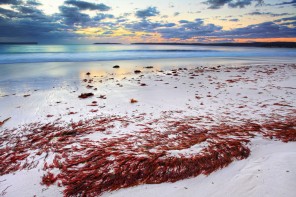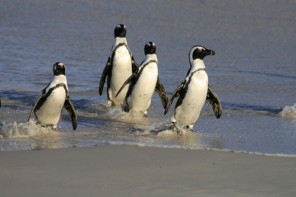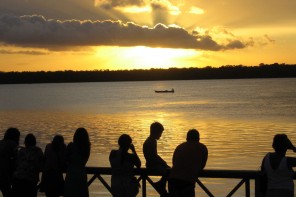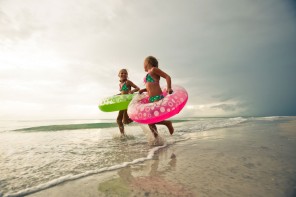After the recent shark dramas, is a good relationship with sharks even possible?
The Cape´s oceans are famous for their Great White population, attracting attention from all around the world. But recent controversy in our bay saw a research team blamed for the fatal shark attack of a young body boarder. While chumming remains a heated debate amongst the likes of scientists, conservationists, surfers, shark cage industry and even governments, what are the real chances of our interactions with sharks having negative repercussions?
Despite public outcry, an American television team conducted a scientific research project on Great Whites in Cape Town waters for almost two months. As these activities coincided with the tragic death of David Lilienfeld – who was bitten by a shark in Kogel Bay – many people started drawing parallels, resulting in bad feelings towards the Ocearch team, the Department of Environmental Affairs (who issued the permit) and the shark chumming industry as a whole.
While concerns are inevitable, especially considering our city’s thriving surf culture, could it simply have been that an angry public needed somewhere to lay the blame? While controversy reigns supreme regarding this issue, it does however raise an emotive topic that perhaps needs more attention – our relationship with sharks.
Sharks are an important part of the eco-system
When we swim in the ocean, we enter shark territory – a majestic sea creature that can be deadly and therefore needs to be respected. But due to films like ‘Jaws’ and perhaps a basic survival instinct, most of us shudder at the thought of sharks. Though fear of the creatures is well-founded and correct, it is important that we understand the vital role sharks play in the animal kingdom rather than hyping up their kill factor.
The Save Our Seas Foundation, an international NGO with a centre in Kalk Bay, believe more can be done to ensure transparency on the topic of sharks:
‘The best thing for shark conservation is safe beaches and it is important to work in these shared spaces with great care,’ says the SOSF. ‘Sharks are vital to the health of our oceans as they regulate the quantity and health of other species of fish and invertebrates, keeping the ecosystem in balance.’
At the end of the day, humans do hold the power to harm sharks, which was evident in last year’s record number of shark hunts in places like Australia, Russia and Mexico. As Great Whites have been endangered before, it is important that we remember them for their positive aspects instead of letting anger and hatred build up.
An unhappy public
Was it only coincidence that a research team was chumming our shores within days of the attack of David Lilienfeld? Although experts claim both incidents to be unrelated, the general public are not so sure. There were already doubts surrounding this contract prior to the attack, and the death of David only worsened the tension.
Many individuals, groups and blogs like ‘Surfers for Responsible Shark Cage Diving‘ have let it be known publically that they are not impressed by the recent state of affairs. ZigZag magazine have been especially noisy on the subject.
An article in the Cape Times last month announced that Paul Botha, spokesman for the surfing community, demanded an independent body examine the circumstance under which the permits were issued. There was controversy surrounding the continuation of chumming off our coastline by the Ocearch team after the attack – which was reinstated on the condition of specific restrictions – but was eventually put to an end due apparently due to public pressure.
When the permit was initially issued we were told by authorities there would ‘definitely not be increased shark activity in areas other than around the Ocearch vessel’, but in retrospect that doesn’t sound too assuring does it? It is true that factors such as natural chum slick from seal island and fishing industry as well as the lack of fish for shark to prey on out to sea added to the chances of an attack, but it is hard to believe that chumming had zero part to play in all this.
Critics point out that chumming off high-use beaches is not practised in other shark-populated countries and that while shark cage diving is great for tourism, shark attacks potentially caused by this industry are certainly not good publicity for South Africa. Some even suggest that the population of Great Whites has reached such a number that culling may be necessary.
The idea that the attack on David Lilienfeld’s was an exploratory mistake has also been put under question, as eye witnesses claimed it attacked him three times sequentially, suggesting the animal had been ‘conditioned’. Conditioning is caused by activities that lead sharks to associate humans and boats with feeding, due to visual recognition and by sensing the electromagnetic fields humans emit.
Another possibility of how the Ocearch team was responsible is that the invasive act of fin tagging caused those sharks affected to alert the other Great Whites in the bay, thus triggering a higher level of aggression than usual. Messing with nature is known to have dire consequences; however at this time theories like this remain nothing but speculation.
Chumming politics
Developing countries are known to attract corrupt business deals from richer countries at the expense of its people. Could it be that this was the case with the Ocearch team? While this remains an on-going debate, perhaps it is the shark cage diving industry as a whole – and its chumming – that needs to be scrutinised.
Although there is still very little known about the effects of cage diving and chumming on sharks, certain studies have shown that ‘conditioning’ is rare but not impossible.
‘White sharks often display curiosity towards new objects in their environment,’ says Australian Great White Shark researcher Dr. Rachel Robbins. ‘They are also capable of learning from experience and altering their behaviour accordingly.’
While scientific research that works to tag and track sharks can ultimately help broaden our understanding of the species, shark cage diving – a booming industry along South African shores – is perhaps a different story. With tourism being a hefty portion of this country’s income, the pressure to attract sharks for the sighting pleasure of holiday-makers is high which means that – despite protection by government and conservationist organisations – Great Whites are vulnerable to exploitation.
While alarmist attitudes do little good, some good points are raised by those against the shark cage diving industry and its chumming.
Avoid attacks
With more and more tourists flocking to our beaches each year, it could be that the number of shark attacks has increased simply because the number of swimmers has too. Although we have shark spotters and flags installed at most beaches, it is important that everyone acts responsibility to reduce the risk of attacks.
Thing to know before you take to the ocean:
- Make sure to enter the water where there are other swimmers
- Understand the risks before you swim too far from shore
- Avoid being in the water at twilight hours
- Refrain from swimming if you have an open wound
- Do not swim in areas where fishing is common
- Never swim near an estuary
Image via saveourseas.com











